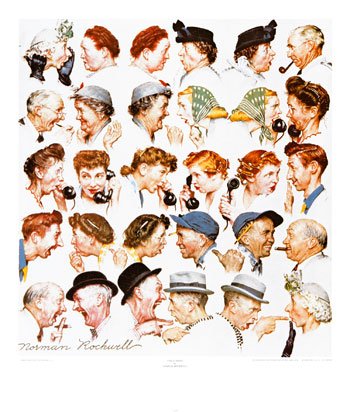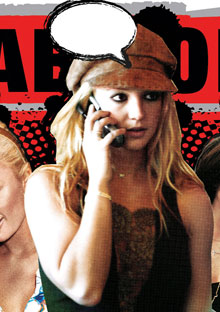Gossip Garborators
Contents
What is Online Harassment/Gossip?
Online harassment covers many different actions; spamming, stalking, threats, gossip columns, blogs, and most recently, cyber bullying. More specific examples can range from persistent unsolicited emails, disturbing newsgroups and bulletin boards to celebrity gossip columns. Online harassment affects a broad array of people, and is not specific to certain groups: everyone is at risk.
The reason online harassment is becoming such a big issue is the seemingly endless connections to, from and between internet users. Recent stats from Mini Watts Marketing group show that approximately 71% of North Americans have access to the internet. Therefore, any gossip or harassment on the internet has access to approximately 238,015,529 people.
Online harassment is spread at an incredibly fast rate. Any type of gossip, or spamming can be attached to emails without you even knowing, meaning that they are being sent by the millions. As word spread about gossip columns or blogs, the number of people affected grows exponentially.
Effects of Online Gossip
Short story about gossip
A woman told a bit of gossip about a neighbour. Within a few days the whole community knew the story. The person it concerned was deeply hurt and offended. Later, the woman responsible for spreading the rumour learned that it was completely untrue. She was very sorry and went to a wise old sage to find out what she could do to repair the damage."Go to the marketplace," he said, "and purchase a chicken, and have it killed. Then on your way home, pluck its feathers and drop them one by one along the road." Although surprised by this advice, the woman did what she was told. The next day the wise man said, "Now, go and collect all those feathers you dropped yesterday and bring them back to me."The woman followed the same road, but to her dismay the wind had blown all the feathers away. After searching for hours, she returned with only three feathers in her hand."You see," said the old sage, "It's easy to drop them, but it is impossible to get them back. So it is with gossip. It doesn't take much to spread a rumour, but once you do you can never completely undo the wrong."
Reference: Author Unknown (http://www.truthminers.org/Gossip.htm) The example above is not online gossip but it perfectly illustrates the effect of the gossip.
Effects of online gossip can be devastating especially in our modern day when almost everybody has access to the internet and with the powerful search engines like “Google” and “Yahoo” makes it easier than ever to find information about someone. Peoples self esteem, reputation, expulsion from post-secondary institution, criminal charges and even a loss of career are all the effects of online gossip. For example, a graduate law student identity was exposed to the public and as a result student was rejected from all the jobs that she applied as well as she felt uncomfortable and embarrassed to go anywhere because majority of people knew her and would instantly start talking about her. Unfortunately, because most of the online gossip is negative rather than positive, effects of online gossip is much bigger problem than most people think because it can lower people’s self-esteem, ruin a successful career, and eventually affect that person for the rest of their life leaving a permanent mark.
Reference: from http://donestech.net/ca/node/567
Real Life Examples
Several examples can be provided to show the severity that online gossip can cause to individuals and groups alike. Many celeberties suffer invasion of privacy, lies and even just a slight stretch of the truth can cause society to view an individual as completely crazy, or a drug addict or alchoholic because of one night of partying consider some of these examples:
This is a you tube clip of Britney Spears. The video was clearly taken in the privacy of her home and sure enough, the public got a hold of it and now the whole world can see it. It's embarassing becaue when your privacy is always invaded you can't be yourself without people saying something about it. I'm sure Britney did not give permission for this video to be released. It's just one of many examples of an invasion of privacy.
http://www.youtube.com/watch?v=_kTPfvCwuhQ
The secound example demonstrates the extent that many people will go to provide the "entertainment" of online gossip. This can be done through mocking celebrities. Mocking can be considered a form of gossip because it depicts an image of a person that the individual would not view themselves as. Consider the following example of mocking Beyonce. Clips like this can be entertaining and make us laugh, but can be very detremental and hurtful to the individual they are potraying negative views about:
http://www.youtube.com/watch?v=BvUvbXhVNVo&NR=1
Although there are several more, another real life example we can use is all the fuss about Lindsay Lohan! I found the following short article on www.funnystuffblog.com ofcourse referring to Lindsay and her apparent drug problem. Well if Lindsay has a drug problem, it's not the business of the whole world, but since she is a celebrity...the whole invasion of privacy rule is slightly forgotten. Take a look at this: (cited from http://www.funnystuffblog.com)
Lindsay Lohan Crack Cocaine Use
Lohan while easily manipulated, really enjoys being a party girl, drinking, and experimenting with drugs. Well eventually her stupidity will catch up to her. Someday she will be the postergirl for the Just Say No to Drugs campaign.
Take a look at this photo to see why …
http://www.funnystuffblog.com/category/celebrities/
Shut Your Mouth!
The overflow in damaging online rumours has lead to many attempts to fight back and in effect get control over internet gabbers enough to shut them down.
Us vs the Stars
Celebrities have high-paid spokespeople and representatives to monitor their social images, but the rest of us are left to protect our own reputations. This is becoming more and more difficult with the increasing amount of gossip readily available to the general public. In the case of celebrities, they are usually protected by publication bans which means that a star's name cannot be used without their explicit consent.
This was a major issue in July 2005 when an online gossip site claimed that two New Zealand sports-stars were involved in a drug ring. Apart from being outraged the players claimed this was in direct violation of their publication bans. Interestingly, any "evidence" against the sport stars from the site was voided by the fact that it was realeased illegally. The e-gossipper would have been prosecuted, but the authorites could not locate them! This is also a major problem in catching gossips, as most of them are smart enough to keep their identities secret and can only be traced by IP address, which can easily be hidden or disguised.
JuicyCampus.com
One prime example of this situation is JuicyCampus' ongoing legal and social battle. The campus-wide online rumour mill has been widely contested by students, parents, authorities and universities since it's creation in 1995. Many students have complained about it's destructive effect and there are recurring claims that the site has refused to withdraw untruthful and derogatory posts even after repeated requests from students. Vicious stories of the site's damaging rumours have been depicted on newscasts worlwide and have even spurred many Australians to divulge their disgust with the whole idea on the sites own pages! On January 23, 2008 Pepperdine University became the first post-secondary institution to block access to the site on the campus network. Duke University followed soonafter by vowing to punish any student who were caught using the site by academic probabtion, scholarship loss, and even expulsion! Enforcing rules like this is more difficult than it sounds however, as JuicyCampus founder Matt Ivester promises the site will be "Always Anonymos...Always Juicy".
Authorities have been trying for some time to find a loophole in the legalities surrounding the site, but to no avail. The Communication Decency Act of 1996 protects site operators from being held accountable for any defamatory posts made by the site's users. The next logical step would be to persecute the users themselves, but the complete anonimity of the site makes it only possible to trace gossippers via IP address, which as mentioned before, is not always a reliable way of locating someone as they can use public computers or block their IP address.
On March 18th 2008, New Jersey officials took a different approach and subpoenaed the site's records for information about the operator's policy on verifying it's users' age (must be over 18) as well as other business practices. The records of advertising giants, Google and AdBrite were also supoenaed after both organizations cut their ties to the site due to JuicyCampus' supposed "violation of terms of service". The results of these investigations remain to be seen, and for now even with all the negative publicity the JuicyCampus is booming.
Fighting Back
Many Organizations have been set up to combat the damages of online gossip and bullying.
Support Sites
Many websites have been set up as a way for victims of online rumours to connect with others and find a way to cope. The largest such site so far is http://www.wiredsafety.org, which provides online help groups, authority contacts, answers to questions, and a vast database of materials about the cause, effect and remedy of online harassment. Http://www.Bullying.org also provides touring presentations to spread awareness about the damaging effects of e-gossip. These presentations are aimed at elementary school children, in hopes that by getting the message to kids early on they will be less likely to engage in any of this kind of behaviour both online and in real-life situations
Law and Order
There are even legal teams devoted to tackling the difficult problem of online bullying. These law enforcement officers specialize in cybercrime investigation and helping online victims. One of these groups called the "Legal Eagles" has prosecutors, defense councilors and other legal experts who are devoted to educating and fighting for online crime prevention.
check it out at http://www.cyberlawenforcement.org
How to prevent Online Gossip
Online gossip can be prevented in a number of ways. One such way is the restriction of sites that promote gossip about other people. These restrictions can be implements such as having to be a member of the site in order to access it. By requiring membership in order to access the site, this ensures that those who take part in the site do so voluntarily, and that they cannot play the "poor me i didn't know" card because they entered and participated in the sight out of their own will. So, by participating on the sight voluntarily, members then must be held accountable for their actions and/or words that are posted on the sight. Once people are made to be accountable for their behavior, they are less likely to go around saying bad things about others, because those bad words can now be traced back to them and they are no longer anonymous. This disabling of anonymous posters can prevent online gossip because no one wants to be seen as the bad guy who goes around trashing others!
Another way online gossip can be prevented is by raising awarness to the public that it is going on and that it is negatively affecting people. One example of this can be seen in backlash from various campuses against the sight "JuicyCampus". This website, which is a gossip forum, has had alot of negative feedback. Some of the ways this sight as been hindered by campuses is through passing resolutions to ban the sight, forming online groups against the sight, and still further other individuals coming together in an attempt to have the sight removed from the web. ( http://chronicle.com/wiredcampus/article/2736/web-site-promising-juicy-campus-gossip-faces-backlash). By recieving such negative feedback, perhaps gossip sights will be detered from furthering their forums, or also from creating new gossip websites. Also, the more awarness people have of this social problem, the more likely they are to take a stance against it. And without participating and supporting members, gossip sites would have no backbone to suport them, and thus would gradually fade away.
A final way to prevent online gossip is to sue those who post pictures and/or information without permission. If gossip sites are violating one's rights, they should have to pay the consequences. So by taking legal action against those sites who do violate one's rights and break the law, this sets an example for other gossip websites not to take it too far. A instance of legal action being taken against unlawful online gossip is the sueing of perezhilton.com by a photography agency.(http://www.cbc.ca/arts/media/story/2006/12/17/perezhilton-lawsuit.html?ref=rss)Taking legal action against gossip sites is an extreme, yet effective way to prevent further online gossip sites.
Prevention Pointers
- keep shared computers in open, commen spaces
- don't give out personal info online
- don't believe everything you see or read
- use "netiquette" and be courteous online, if others don't treat you in the same way, don't reply
- don't message when you're angry
Tips for Victims of Online Gossip
- don't respond to online bullies
- tell some one you know and trust about what is going on
- inform your internet service provider
- inform the local police
- keep the posted gossip, as it may be your only evidence
- protect yourself, don't meet with strangers
E-Gossip in the Workplace and School
Gossip has existed for as long as there has been people working in an office. As much as technology has helped institutions and businesses, however, this also caused the unwanted evolution of gossip from the water cooler to the internet.
Instant messenger
Perhaps the most popular way for employees to communicate is through an instant messenger, a service in which 74% of downloads in the office were installed by employees for their own purposes. Instant messenger has the potential to bring great efficiency to the office and help communications run much more smoothly, however offices have to find a way to regulate it's use, as office gossip can ruin a company's reputation, or damage the business in many ways. Surveys have found that much of the information shared among IM conversations risk the good of the business:
- 25% have used IM to say something they boss wouldn't approve of
- 16% use it to send or receive sensitive company information
- 25% use it for office gossip
- 80% of 18-29 year-olds use IM to chat to friend and family
- 25% of 18-29 year-olds have used IM to download music and film trailers at work
Web versions of messenger such as MSN's Web Messenger (http://webmessenger.msn.com/) allow users to access messenger on their browser, without ever downloading. This makes using IM services at schools and offices much easier to do and alot harder to detect. People always find a need to talk behind others backs, almost as if it is some sort of therapy. So when it is so easy to talk without being heard by unintended sources on IM, People find it extremely hard to keep their lips sealed, making IM one of the leading sources of privacy intrusion.
Blogs and Social Networking
Blogs are an "online diary" of sorts, and social networking is where people can communicate with others by posting material online. Both are a personal place on the internet where one has the ability to freely express all of his/her thoughts online, where everyone and anyone with an internet connection has access to the information. You can also choose whether you want your information to be anonymous or not, therefore causing the blog to be a popular site for verbal attacks on other people. Schools and educational institutions have been the main target of such attacks, but there is not shortage in how seriously they take such acts, As seen in whiteland community high school, Superintendent Dr. John Coopman said when asked about the subject of online blog attacks, specifically myspace (http://www.myspace.com): "We actually had a student who had to withdraw from school because of the discomfort that they felt from their peers at school because of what was being posted on the Internet" (http://www.wthr.com/Global/story.asp?S=5443245) The school wishes hold students accountable for their actions in all dimensions of life, all the time, whether they are on the internet or not. When we are at the stage of technology where someone can bring down another persons reputation by simply pressing a few keys, measures to protect others and yourself must be set into place.
References and Group Members
Muli K.
1. http://www.youtube.com/watch?v=mtgIaPNuYvk – Real life example invasion of privacy for the sake of gossip.
2. http://www.youtube.com/watch?v=_kTPfvCwuhQ –Real life example Britney Spears
3. http://labourrelations.org/FeatureArticles/HowToEliminateOfficeGossip.html - How to illiminate Gossip…
4. http://www.eonline.com/gossip/awful/index.jsp Actual online gossip website
5. http://anunlovedone.wordpress.com/2008/02/24/clinton-lies-about-nafta-and-xerox-speeches/
6. http://firstread.msnbc.msn.com/archive/2008/02/20/684411.aspx -Hillary Clinton dirty politics, real life example
7. http://www.youtube.com/watch?v=BvUvbXhVNVo&NR=1 – Real life example mocking
8. http://www.youtube.com/watch?v=VJ5unYaNd3c&feature=related - Standing up to negative gossip
9. http://www.youtube.com/watch?v=dU4Uf_doC7g – The pain it causes Tyra
10. http://www.nypost.com/gossip/gossip.htm - Online gossip articles
11. http://www.funnystuffblog.com/category/celebrities/
Joelle D.
1. http://chronicle.com/wiredcampus/article/2736/web-site-promising-juicy-campus-gossip-faces-backlash
2. http://chronicle.com/wiredcampus/category/Social-Networking/
3. http://tierneylab.blogs.nytimes.com/2007/10/18/science-explains-the-national-enquirer/
4. http://www.cbc.ca/arts/media/story/2006/12/17/perezhilton-lawsuit.html?ref=rss
Lana M.
1.http://www.fims.uwo.ca/NewMedia2006/default.asp?id=412
2.http://www.fims.uwo.ca/NewMedia2006/default.asp?id=325
4.http://www.rottenneighbor.com
6.http://www.ed.uiuc.edu/wp/crime/harassment.htm
7.http://drphil.com/shows/show/1003/
9.http://cyberlawenforcement.org
11.http://www.baylor.edu/Lariat/news.php
Keara M.
1. http://www.ed.uiuc.edu/wp/crime/harassment.htm
2. http://www.gmu.edu/facstaff/sexual/brochures/OnlineHarrassment.pdf
3. http://www.fims.uwo.ca/NewMedia2006/default.asp?id=325
4. http://www.internetworldstats.com/stats.htm
5. http://www.helium.com/tm/872758/should-papers-allowed-invade
6. http://www.rumorficial.com/
7. http://www.tmz.com/category/star-catcher/
8. http://www.famesters.com/forums/celebrity_gossip
9. http://news.ninemsn.com.au/article.aspx?id=182457
10. http://www.gossiportruth.com/
Ramil S.
1. NewMedia Journalism. “Online gossip marketing a two-way street” Found February 28,2008 from
http://www.fims.uwo.ca/NewMedia2006/default.asp?id=470
2. The Tartan. “Colleges gossip online” Found February 28,2008 from
http://www.thetartan.org/2008/2/18/news/gossip
3. EOnline. “Todays Top Gossip Headlines” Found February 28, 2008 from
http://www.eonline.com/gossip/index.jsp
4. Yahoo News. "Web of Lies" Found February 28,2008 from
http://potw.news.yahoo.com/s/potw/62428/web-of-lies
5. “Did Online Gossip sink law student’s career?” Found February 28,2008 from
http://donestech.net/ca/node/567
6. The Province. “Oilers ban online gossip” Found February 28, 2008 from
http://www.canada.com/theprovince/news/etoday/story.html?id=ed4d6afc-3a50-445c-a77a-48cbd41864f1
7. The New York Times. “Good Gossip or Bad Gossip?” Found February 28,2008 from
http://tierneylab.blogs.nytimes.com/2007/10/15/good-gossip-bad-gossip/index.html
8. “The Net Effect” Found February 28,2008 from
http://criminaljustice.state.ny.us/missing/graphics/neteffects.pdf
9. eSchoolNews . “School Districts crack down on online gossip” Found February 28,2008 from
http://www.eschoolnews.com/news/top-news/index.cfm?i=35647&CFID=5146821&CFTOKEN=74949121
10. “The Death of Online Gossip” Found February28,2008 from
http://bamber.blogspot.com/2007/01/death-of-online-gossip.html
Anthony T.
1. http://www.chillingeffects.org/weather.cgi?WeatherID=555
2. http://www.news.utoronto.ca/bin6/thoughts/070410-3099.asp
3. http://dailygleaner.canadaeast.com/search/article/211866
4. http://www.canadianbusiness.com/managing/article.jsp?content=20041122_63827_63827&page=2
5. http://www.concurringopinions.com/archives/2007/11/responses_to_bl.html
6. http://www.chicagotribune.com/business/chi-gossip-story,1,2452640.story
7. http://news.bbc.co.uk/1/hi/technology/4552405.stm
8. http://www.uni.uiuc.edu/og/opinions/2006/11/no-i-dont-love-your-gossip-thank-
9. http://www.salon.com/feature/1998/01/cov_28feature2.html
10. http://www.wvhc.staywellsolutionsonline.com/Library/Wellness/1,2132





